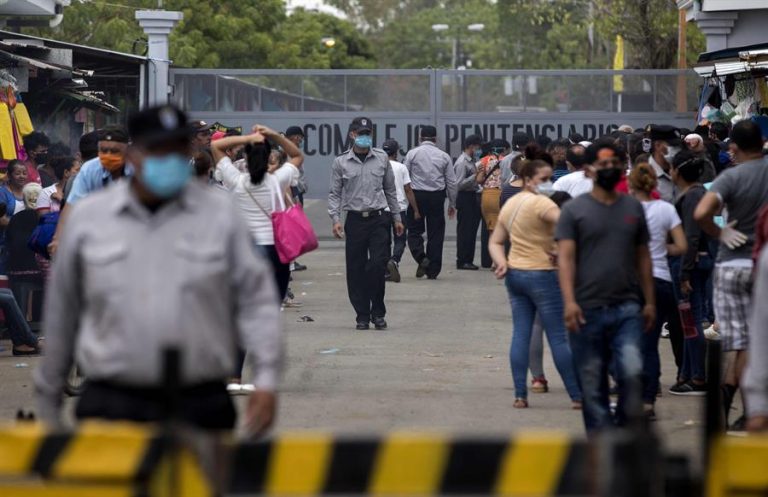6 de octubre 2020

Ortega Grants Chinese Company a Huge Mining Concession

PUBLICIDAD 1M
PUBLICIDAD 4D
PUBLICIDAD 5D
Relatives and human rights defenders don’t know the health condition of inmates on hunger strike

The three political prisoners who sewed their mouths in protest
The three political prisoners who sewed their mouths in protest, were moved to maximum security cells in “La Modelo” prison, informed their relatives and the Permanent Commission on Human Rights (CPDH) on the weekend. There is no further information on their health condition.
The three political prisoners with their mouths sewn are: Jose Santos Sanchez Rodriguez, Ernesto Garcia and another only identified as Nestor. They “sewed their mouths with thread to protest the difficult situation they face,” the CPDH specified in a press release.
The CPDH also notified international human rights organizations of the protest. “We will continue to monitor the difficult situation the political prisoners are going through. We demand their release and humane treatment for all those prisoners” the document says.
Karen Lacayo, President of the Association of Relatives of Political Prisoners, explained that the inmates sent her some images showing their lips sewn and told her to publish them “because we cannot bear to be incarcerated, we are not afraid,” Lacayo recalled.
The protest of the three prisoners who sewed their lips is part of a hunger strike that 53 of the 104 political prisoners of the Daniel Ortega regime began this week. The inmates explained through a letter that the prison guards threaten to arrest their relatives so they desist from protesting. “We demand our freedom and also the end of the besiegement and threats against our relatives,” they wrote.
Since the political prisoners began their hunger strike on September 30, prison guards have threatened to move them to maximum security cells or imprison their families if they do not give up the protest.
“They tell the prisoners that they are going to capture us, the wives. That they are going to plant drugs on us to put us in prison if we don’t stop demanding their freedom. They suffer physical torture that has left them with aftereffects, but they also suffer from the threats,” Heydi Hurtado, wife of prisoner Jose Santos Sanchez, told the EFE news agency.
The woman also warned that the hunger strike is a call to opposition groups to unite in the struggle to restore democracy in Nicaragua.
Meanwhile, the Association of Political Prisoners of Nicaragua denounced that the Ortega regime continues to recapture released political prisoners. Such is the case of Jordani Garcia Cardenas from the department of Jinotega. He was re-arrested by the Police this October 2 after being benefited from the Amnesty Law in May 2019.
The Police presented Garcia to the local media as the alleged perpetrator of the crime of drug-trafficking. Danny Garcia Gonzalez of Masaya was arrest for the same crime on September 14. Now, they are part of 15 political prisoners whom the regime granted amnesty and months later captured again.
The recapture of the amnestied political prisoners began one month after their release. The first was Jaime Navarrete, released on June 10, 2019 and recaptured on July 24, 2019, for alleged drug-trafficking and illegal possession of weapons. This situation repeated itself for more than a year. However, the Alarm bells sounded on September 15 when President Ortega expressed his intent to establish the sentence of life-imprisonment to “punish” the opposition.
“They feel untouchable” because they have the backing of the United States. “But there will not be another amnesty… That’s what the laws are for, to punish, to sanction. Not because of what they say but because of what they do,” said the 74-year-old ruler. The regime’s repression has led to more than 300 killed, thousands wounded, over 700 political prisoners, of which 104 remain in prisons, and 100,000 exiles.
The threats against political prisoners who remain on hunger strike at La Modelo prison are part of the torture and cruel treatment that the regime has given to prisoners. According to their relatives, lawyers, human rights defenders, and other previously released prisoners, the prisoners are beaten at some time, remain in overcrowded conditions and are now exposed to the contagion of Covid-19.
Political prisoners such as Uriel Perez, from Masaya, have become seriously ill due to the unsanitary conditions in which they remain. Last May, Perez was rushed to the “Aleman Nicaraguense” Hospital without anyone notifying his family. His mother, Silvana Perez, waited for him on May 12 in a Managua court, for an oral and public hearing. However, the young man was never brought to that hearing.
The mother declared him missing and, after hours of waiting and searching, they confirmed that he was admitted to the Intensive Care Unit of the “Aleman Nicaraguense” Hospital, were Covid-19 patients are referred. She was told that he was intubated and his diagnosis was “severe pneumonia.” A month later Perez was moved to a maximum-security cell at the “La Modelo” prison.
Archivado como:
PUBLICIDAD 3M
Confidencial es un diario digital nicaragüense, de formato multimedia, fundado por Carlos F. Chamorro en junio de 1996.
PUBLICIDAD 3D